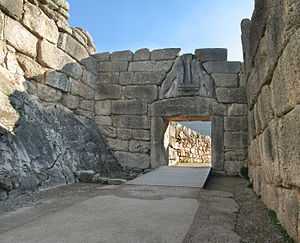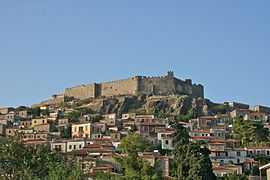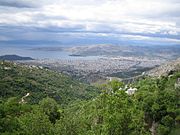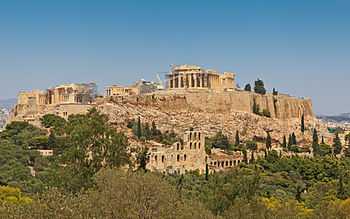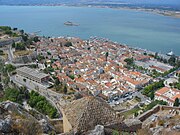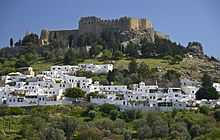Tourism in Greece
| Economy of Greece |
|---|
 |
| Overview |
|
| Greece topics |
|
Greece attracts more than 22.5 million people each year,[1] contributing 18% to the nation's Gross Domestic Product.[2] Greece has been an attraction for international visitors since antiquity for its rich and long history, Mediterranean coastline and beaches.[3] In 2005, 6,088,287 tourists alone visited the city of Athens, the capital city.
History
Tourism in Greece traces its roots to the ancient times. Cultural exchange took place between the Greek colonies of Magna Graeca and the young Roman Republic before Rome's rise to dominance of the Western Mediterranean. When Greece was annexed by the Roman Empire centuries later, the cultural exchange that started between the two civilization triggered as a result a large number of Romans visiting the famous centers of Greek philosophy and science, such as Athens, Corinth and Thebes, partly because Greece had become a province of the Roman Empire and Greeks were granted Roman citizenship.
Tourism in modern-day Greece started to flourish in the 1960s and 1970s, in what became known as mass tourism.[4] During that time, large-scale construction projects for hotels and other such facilities were undertaken and the country saw an increase in international tourists over the years.[4] International events such as the 2004 Summer Olympic Games and the Eurovision Song Contest 2006, both held in Athens, greatly helped to boost tourism in the country, while large-scale nationally-funded cultural infrastructure such as the New Acropolis Museum also contributed to the flow of tourists in the country.Thessaloniki will be European youth capital in 2014.
Visitors

In 2009, the country welcomed over 19.3 million tourists,[5] a major increase from the 17.7 million tourists the country welcomed in 2008.[6] The vast majority of tourists in the country are from within the European Union (12.7 million), followed by those from the Americas (0.56 million), Asia (0.52 million), Oceania (0.1 million) and Africa (0.06 million).[1] In the year 2007, more British people visited the country than any other nationality, numbering 2.61 million in total, making up 15% of the country's tourists for that year alone. Additionally, 2.3 million Germans, 1.8 million Albanians and 1.1 million Bulgarians visited the country that year.[1] In 2007, 92.8% of the total number of tourists in Greece were from countries in Europe.[1]
The most-visited region of Greece is that of Central Macedonia in northern Greece, near some of the most popular attractions in the country such as Halkidiki, Mount Olympus, Pella, the birthplace of Alexander the Great, and Greece's second-largest city, Thessaloniki.[6] In 2009, Central Macedonia welcomed 3.6 million tourists, or 18% of the total number of tourists who visited Greece that year,[6] followed by Attica (2.6 million) and the Peloponnese (1.8 million).[5] Northern Greece is the country's most-visited region, with 6.5 million tourists, while Central Greece comes second with 6.3 million.[5]
According to a survey conducted in China in 2005, Greece was voted as the Chinese people's number one choice as a tourist destination.[7][8] In November 2006, Austria, like China, announced that Greece was the favourite tourist destination for its citizens.[9] In line with these observations, Greece's former Minister of Tourism Aris Spiliotopoulos announced the opening of a Greek National Tourism Organization office in Shanghai by the end of 2010, and GNTO currently operates two tourism offices in China, one in Shanghai and one in Beijing.[10] It is estimated that throughout 2013 Greece welcomed over 17.93 million tourists, an increase of ![]() 10% compared to 2012.
More than 22 million tourists are expected throughout 2014.
Tourism in Greece will typically peak between May and September where approximately 75% of all tourist visits happen.[11]
10% compared to 2012.
More than 22 million tourists are expected throughout 2014.
Tourism in Greece will typically peak between May and September where approximately 75% of all tourist visits happen.[11]
Economic impact
At the same time, tourism consumption increased considerably since the turn of the millennium, from US$17.7 bn. in 2000 to US$29.6 bn. in 2004. The numbers of jobs directly or indirectly related to the tourism sector were 659,719 and represented 16.5% of the country's total employment for that year.
Infrastructure
As a developed country highly dependent on tourism, Greece offers a wide variety of tourist facilities.[12] Tourism infrastructure in Greece has been greatly improved since the 2004 Athens Olympic Games and continues to expand with a number of important projects particularly in areas of less mass-tourism.[13]
Hotels and conference facilities


Conference tourism, targeted at academic, business, or cultural markets is a cornerstone of the Greek national tourism policy. As a result, the Greek government, with strong support from local authorities, has been offering lucrative cash grants, leasing and employment subsidies and tax allowances to establish new conference facilities and expand existing ones. In a recent report in Meeting and Incentive Travel, Greece was ranked eighth in the world in overnight stays for conferences. Figures from the Tourism Satellite Accounting Research, conducted by WTTC (World Travel & Tourism Council) project a worldwide increase in revenues in business travel to Greece from US $1.51 bn. in 2001 to US $2.69 bn. in 2011. In 1998, the figure stood at US $1.18 bn.
According to the Hellenic Chamber of Hotels, the number of hotels in Greece was by classification (bedplaces):
| Star rating | Number | Beds |
|---|---|---|
| 5 star | 176[14] | 64,913[14] |
| 4 star | 994[14] | 176,631[14] |
| 3 star | 1,804[14] | 163,077[14] |
| 2 star | 4,460[14] | 231,333[14] |
| 1 star | 1,677[14] | 57,298[14] |
| Total | 9,111[14] | 693,252[14] |
Marinas
Greece has 51 marinas and 14,661 mooring places that provide such services as berths, fuel, water and electricity, telephony, and repairs. Some of the most developed and busiest marinas in Greece are just a few kilometres from the centre of Athens. The marinas of Alimos and Flisvos, on the south coast of Athens, have an aggregated capacity of more than 1,800 vessels.
Spas and thermal springs
Greece has 752 thermosprings. Many have been classified as therapeutic by the National Institute for Geographical and Mineral Research.

Museums
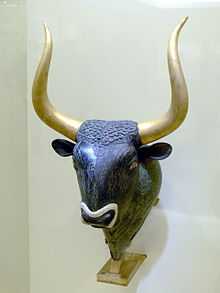
Several kinds of museums are located in the Hellenic Republic. Most of them can be found in the big cities like Athens, where the famous New Acropolis Museum and the National Archaeological Museum are located. Furthermore there is a vast number of galleries like the National Gallery (Athens). There are many museums in Thessaloniki too, like the Byzantine Museum. Overall, there are approximately 150 museums all over the country which are easily accessible for the tourists.
Archaeological sites and cities
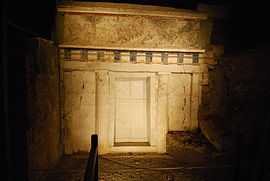
.jpg)
- Acropolis of Rhodes: The Acropolis of Rhodes is an acropolis dating from the Classical Greek period (5th–3rd century BC).
- Acropolis of Lindos: A natural citadel which was fortified successively by the Greeks, the Romans, the Byzantines, the Knights of St John and the Ottomans.
- Ancient Thera: An antique city on a ridge of the steep, 360 m high Messavouno mountain on the Greek island of Santorini.
- Abdera, Thrace: A city-state on the coast of Thrace 17 km east-northeast of the mouth of the Nestos, and almost opposite Thasos.
- Akrotiri (Santorini): A Minoan Bronze Age settlement on the volcanic Greek island of Santorini (Thera).
- Ambracia: Ruins of the ancient capital of Pyrrhus of Epirus in modern Arta in Epirus.
- Amphipolis: An ancient city in the region of Macedonia once inhabited by the Edoni people.
- Argos: Several ancient ruins, including the Heraion.
- Athens: The Greek capital has many archaeological sites, the most famous being the Acropolis and the Ancient Agora of Athens.
- Bassae: An archaeological site in the northeastern part of Messenia, Greece.
- Chalcis: on Euboea.
- Ancient Corinth: Ancient ruins near the modern town include the Temple of Isthmia and the Temple of Apollo.
- Delos: Uninhabited island famous for its numerous archaeological sites, including the Stoivadeion, the Temple of the Delians, the Terrace of the Lions and the House of the Dolphins.
- Delphi: Town in western Greece, with a distinguished ancient theatre, the site of the Oracle.
- Dion, Pieria: The sacred place of the Ancient Macedonians. Dion is the site of a large temple dedicated to Zeus, as well as a series of temples to Demeter and to Isis.
- Dodona: The shrine of Dodona in Epirus was regarded as the oldest Hellenic oracle, possibly dating to the second millennium BCE according to Herodotus.
- Eleusis: From as early as 1700 BC up to the 4th century AD, Eleusis was the site of the Eleusinian Mysteries, or the Mysteries of Demeter and Kore.
- Elaea (Epirus): An ancient harbor town at the mouth of the Acheron river of Epirus.
- Epidaurus: The ancient theatre, now restored.
- Gitanae: Ruins of ancient Gitanae in Epirus.
- Kameiros: An ancient city on the island of Rhodes, in the Dodecanese, Greece.
- Knossos: Archaeological site on Crete famous for its ruined Minoan palace, with bull motifs.
- Leibethra: An ancient city close to Olympus where Orpheus was buried by the Muses.
- Lycosura: A city of Arcadia said by Pausanias to be the oldest city in the world.
- Meteora: The monasteries, which are World Heritage Sites.
- Mycenae: In the second millennium BC, Mycenae was one of the major centres of Greek civilization, a military stronghold which dominated much of southern Greece. The period of Greek history from about 1600 BC to about 1100 BC is called Mycenaean in reference to Mycenae.
- Messene: Most of the area of Ancient Messene contains the ruins of the large classical city-state of Messene refounded by Epaminondas in 369 BC.
- Necromanteion: Nekromanteion was an ancient Greek temple of necromancy devoted to Hades and Persephone.
- Nicopolis: or Actia Nicopolis was an ancient city of Epirus, founded 31 BC by Octavian in memory of his victory over Antony and Cleopatra at Actium the previous year.
- Olympia: Many ancient ruins, including the Temple of Zeus, the Temple of Hera, the Palaestra and the Leonidaion.
- Olynthus: An ancient city of Chalcidice.
- Palace of Nestor: Palace of Nestor is the primary structure within a larger Late Helladic era settlement, likely once surrounded by a fortified wall
- Pella: The capital of Ancient Macedonia and birthplace of Alexander the Great and Philip II of Macedon.
- Phaistos: a Bronze Age archaeological site at Faistos, a municipality in south central Crete.
- Philippi: Established by the king of Macedon, Philip II, on the site of the Thasian colony of Krinides or Crenides.
- Sounion: The Temple of Poseidon.
- Samothrace temple complex: is one of the principal Pan-Hellenic religious sanctuaries, located on the island of Samothrace.
- Stagira (ancient city): Ruins of the ancient city known as the birthplace of Aristotle.
- Sparta: Near the modern town are ancient ruins, the most important being the tomb of Leonidas.
- Tiryns: A Mycenaean archaeological site in Argolis in the Peloponnese.
- Tegea: A settlement in ancient Greece. Ancient Tegea was an important religious center of ancient Greece, containing the Temple of Athena Alea.
- Thebes: Ancient city that once rivalled Athens, and featured in Greek myth.
- Thermopylae: Primarily known for the battle that took place there in 480 BC, in which an outnumbered Greek force probably of seven thousand (including the famous 300 Spartans) held off a substantially larger force of Persians estimated in the range 70,000-300,000 under Xerxes.
- Thessaloniki: City with many historic buildings, some World Heritage Sites, including the Arch and Rotunda of Galerius, the Church of Panagia Chalkeon and the White Tower.
- Vergina: The Macedonian Royal Tombs and the ruins of the ancient Macedonian capital in the region of Macedonia, Greece. It is a World Heritage Site.
Promoting Greek tourism
The government intends to promote winter tourism in Greece, which could potentially increase international arrivals even further.
Tourism in Greece is run by the Greek National Tourism Organisation (GNTO) who used Helena Paparizou, a famous Greek singer who won Eurovision Song Contest in 2005 as an ambassador. Singer Sakis Rouvas,[15] who represented Greece in the 2009 Eurovision song contest is currently the ambassador for Greek Tourism. The new logo of the Greek National Tourism Organisation consists of nine circles, which symbolize the nine new kinds of tourism that should be promoted to combat the tourism sector's seasonality. The new logo's slogan is "Greece, the true experience", which shows that the marketing campaign is nowadays directed towards experience seekers and not just mass tourism.[16]
The drawback of the new logo is that at a first glance it cannot be associated with Greece. The advertisements displayed in the GNTO's web-site still focus on the triptych of sea, sun and sand. However, the tourism campaign is undergoing a significant change as city-breaks and conference tourism are promoted, along with cultural and wellness tourism. The impact of the new campaign will hopefully result in increased tourist revenues. The name of commercials is You in Greece.
Gallery
-

View of Kavala.
-

Panoramic view of Thessaloniki.
-
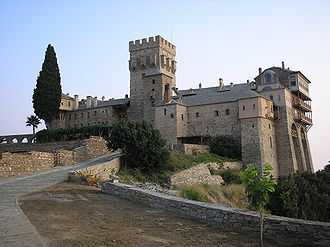
Stavronikita monastery in Mount Athos, Chalkidice.
-
Kastoria, northern Greece.
-

Deer hunt mosaic in Pella.
-
.jpg)
Ancient Dion, Pieria.
-

Lion of Amphipolis.
-

Pisoderi ski resort.
-

Metsovo town.
-

The ancient theatre in Dodona.
-

Overview of Parga
-

Mastichochoria, Chios island.
-

View of Delphi.
-
The port of Naupactus.
-
Nafplion
-

The theatre at Epidaurus.
-
The Palace of Mystras.
-

Vatheia, Mani peninsula.
-
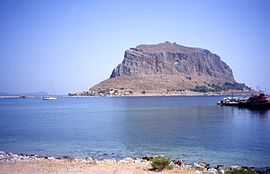
Rock of Monemvasia.
-

Symi island.
-
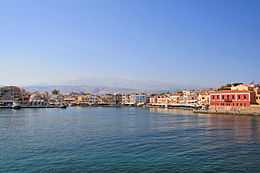
Venetian port of Chania.
-

Minoan palace of Knossos.
See also
References
- ↑ 1.0 1.1 1.2 1.3 "02. Record Number of Tourists in Greece This Year ( November 2014 )". Greek Reporter. November 2014. Retrieved 26 November 2014.
- ↑
- ↑ Greece by Paul Hellander, Kate Armstrong, Michael Clark, Des Hannigan
- ↑ 4.0 4.1 "Greece Tourism: Information about tourism in Greece and the Greek Islands". www.greeka.com. Retrieved 17 May 2011.
- ↑ 5.0 5.1 5.2 "Nights spent in tourist accommodation establishments - regional - annual data". http://epp.eurostat.ec.europa.eu/. 2010. Retrieved 19 May 2011.
- ↑ 6.0 6.1 6.2 "Tourism" (PDF). http://epp.eurostat.ec.europa.eu/. 2010. Retrieved 19 May 2011.
- ↑ SkyscraperCity - View Single Post
- ↑ Minister says Greece, China to be best tourist partners
- ↑ http://www.voiceofgreece.gr/OmogeneiaMainNews_en.asp?ID=22066
- ↑ "GNTO Offices Abroad". www.visitgreece.gr. Retrieved 19 May 2011.
- ↑ "Tourism in Greece". Tourism in Greece. Greeka.com. Retrieved 28 March 2014.
- ↑ http://travel.state.gov/travel/cis_pa_tw/cis/cis_1127.html
- ↑ http://www.costanavarino.com
- ↑ 14.0 14.1 14.2 14.3 14.4 14.5 14.6 14.7 14.8 14.9 14.10 14.11 "Table 2: Hotels classified by star rating, 2006" (PDF). NSSG/HCH. www.statistics.gr. 2006. Archived from the original (PDF) on 2007-10-23. Retrieved 2007-09-21.
- ↑ http://www.enet.gr/online/online_text/c=112,id=905204. Retrieved 2009-02-23
- ↑ http://www.visitgreece.gr
External links
| Wikivoyage has a travel guide for Greece. |
| |||||||||||||||||||||||||||||||||||||||||||||||
| ||||||||||||||


